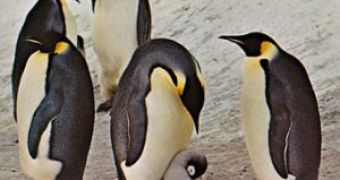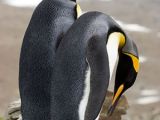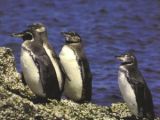Penguins are a bird family which evolved soon after the dinosaur extinction from a common ancient ancestor with loons and petrels, as DNA analysis showed. They live exclusively in the Southern Hemisphere, from Antarctica to the tropics, in Galapagos islands.
Some fossil penguins were 1.8 m (6 feet) tall and weighed 80 kg (200 pounds). Today, emperor penguin (image above) from Antarctica is the largest species, 1.2 m (4 feet) tall and weighing 40 kg (100 pounds). Penguins are meat-eaters and catch krill (tiny shrimplike crustacean), fish and squids.
Nowadays, world's penguin populations are under an increasing pressure by human activity. "Penguin populations all over the world are being affected by things like global warming and by food reduction in areas where they breed," said Gary Miller, a behavioral ecologist from University of Western Australia, Perth.
Commercial overfishing of krill and fish on the Antarctic seas is putting increasing pressure on food chains and food availability for penguin populations and could trigger the catastrophic collapse of many marine species. "Fish stocks are under enormous pressure from commercial fishing, and their depletion will in turn affect the survival of many Antarctic species," said Paul Ponganis, a physiologist at the Scripps Institution of Oceanography in La Jolla, California.
Some species seem not to be affected by overfishing. "For king penguins (photo center), which live in the sub-Antarctic but not Antarctica, population numbers, if anything, are on the increase," said Lewis Halsey, a behavioral physiologist at the University of Birmingham in the United Kingdom.
This species consume myctophids (lantern fish), deep sea small fishes, which are not of commercial value. "So to some degree there is not a clash between king penguins and fishermen," Halsey said.
As penguins - during their evolution - formed nesting colonies in southern isolated islands, with no land predators, they generally pay little attention to humans. "Penguins have generally evolved in places where humans haven't lived, particularly those species that live on Antarctica or sub-Antarctic islands," Halsey said. "They're easy to study, because you can walk right up to them." But prolonged human presence can stress penguins.
"On Crozet Island in the sub-Antarctic, where there is a small human presence, due to research and the transport of cargo on and off the island, there is a large king penguin colony [that is] showing signs of decreasing population, while king penguins in general are showing an increase," Halsey said.
Many experts believe that increased tourism in Antarctica could lead to negative impact on penguin populations. "The Antarctic is an extremely fragile environment, and the mere presence of thousands of people visiting colonies during the breeding period has the potential for damage to the population," said Ponganis. "Most people don't realize that merely viewing wild animals can cause them stress, which in turn might affect their chick-rearing abilities," he said.
"If you add in the risk for introducing pathogens, such as bird flu, you can see that uncontrolled ecotourism to a pristine environment, such as the Antarctic, is an accident waiting to happen."
Penguins are also particularly vulnerable to oil spills. Oil pollution, also, kills tens of thousands of penguins annually. "Penguins are quite vulnerable to the toxic effects of oil," Miller said.
"They get it on their feathers ? and end up eating quite a lot of it. If it doesn't kill them, it might make them more susceptible to disease."
But, amongst all the dangers, human-made global warming is by far the highest. Gal?pagos penguins (photo bellow), an endangered species, are at particular risk as global warming has been producing more El Ni?o phenomena, with catastrophic effects on this species. Polar regions have seen temperatures rise by several degrees in the last century. The slightest change in seawater temperatures affects ice cover and food availability. Global warming is damned for the decline by 50 % of the emperor penguin populations over the past 50 years. "Emperor penguins are particularly vulnerable to changes in ice," Miller said.
"They nest on sea ice, put an egg on their feet, and then stand around for months. But if that sea ice isn't sturdy enough to last until New Year's [when chicks are ready to head out to sea], they're not going to be able to raise their chicks."
"On a single breath of air, these birds can dive as deep as 500 meters [1,640 feet] and as long as 20 minutes-a feat that few other species, and no other bird, can match."
"A world without emperor penguins in it would be a lesser one", Ponganis said.

 14 DAY TRIAL //
14 DAY TRIAL // 

